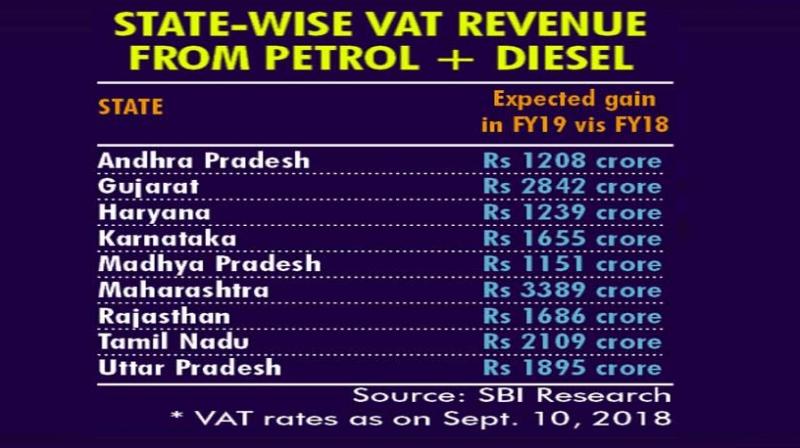Petrol prices rule high as govt stubborn on fiscal target
Centre collected a staggering Rs 2,29,019 crore as excise revenue from the petroleum sector in FY18.

New Delhi: Petrol and diesel consumers will have to suffer more pain. They will have to pay through the nose to run their automobiles, thanks to the Modi government’s eagerness to meet fiscal deficit target. The government is banking heavily on the revenue buoyancy to present a rosy fiscal picture before the Lok Sabha elections, but the narrative seems to be a wee bit different.
The direct tax collection data released by CAG paints an uninspiring picture showing that collections grew by a mere 6.6 per cent during April-July of the current financial year against the budget target of 14.4 per cent for 2018-19. The GST collections have also failed to reach the desired Rs 1 lakh crore per month.
It even dropped to Rs 93,960 crore in August.
In such a scenario, the Centre weighing heavily on revenue from the oil sector to fill its coffers even if means more suffering for auto fuel consumers who are feeling the brunt of a falling rupee and consistent increase in international price of crude. The state’s fiscal concerns have also made them vary for any big changes in VAT rates on petrol and diesel.
As per oil ministry’s Petroleum Planning and Analysis Cell, while Centre collected a staggering Rs 2,29,019 crore as excise revenue from the petroleum sector in FY18, states VAT collection from the sector has just about reached Rs 1,84,091 crore in FY18 even though VAT rates is over 30 per cent in several states.
Also, due to frequent excise duty increases, the Centre has more than doubled its collections from a level of Rs 99,184 crore in FY15, the collections for states has progressively increased over last few years owing to increase in price of the petroleum products. State gains have been higher as they levy VAT on value of petrol and diesel (ad valorem duty).
As per a report prepared by State Bank of India, the increase in petrol and diesel prices is likely to give states a windfall gain of around Rs. 22,700 crores over and above the budget estimates for current fiscal. The increase translates into revenue gain of Rs 1513 crore for every $1 increase in international oil prices to all the major 19 states of the country.
“It is time government thinks of bringing petroleum products under the GST regime to reduce high levels volatility. But immediately, states should agree to cut VAT rate on petrol and diesel by 5-6 per cent along with some cut in excise rate by the Centre.
The economy is growing by over 8 per cent and tax revenues are going up. There is no reason why the government’s reliance on oil sector for taxes should reduce even now,” Kirit Parikh, chairman, Integrated Research and Action for Development (IRADe) and former member of Planning Commission told FC earlier.
In the last six months (since March) petrol and diesel prices have increased by over Rs 6 and Rs 7, respectively in Delhi. Pump price of petrol in Delhi on Monday stood at all time high level of Rs 82.06 per litre and diesel at Rs 73.78 a litre. In fact, petrol price has already breached the Rs 90 a litre mark in Maharashtra.
Sources said the Centre is also failing miserably to get all states to agree for VAT cut on the two petroleum products. The average VAT rate is over 30 per cent and states have actually made a killing during the current run of retail price rise for petrol and diesel as it has increased their tax kitty substantially.
“The important issue is to prevent any further increase in diesel prices that could fuel inflationary pressure and put pressure on growth prospects of the economy,” said BK Chaturvedi, former cabinet and oil secretary.

